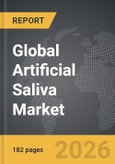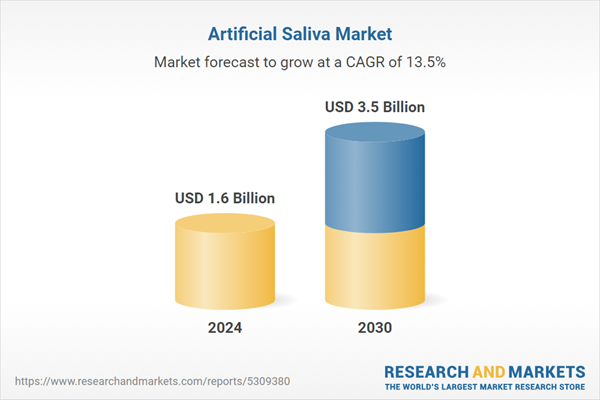Global Artificial Saliva Market - Key Trends and Drivers Summarized
Why Is Artificial Saliva Gaining Importance in Oral Healthcare?
Artificial saliva has become an essential product in oral healthcare, particularly for individuals suffering from xerostomia, commonly known as dry mouth. This condition, often caused by certain medications, autoimmune diseases like Sjögren's syndrome, radiation therapy, or aging, results in a decrease in saliva production, leading to discomfort, difficulty in speaking, swallowing, and an increased risk of dental cavities and infections. Artificial saliva products are designed to mimic the properties of natural saliva, providing lubrication, moisture, and relief from the symptoms of dry mouth. These products come in various forms, including sprays, gels, lozenges, and rinses, making them accessible and easy to use for those who need regular relief. As awareness of dry mouth and its associated risks grows, artificial saliva is increasingly recognized as a crucial component in maintaining oral health and improving the quality of life for affected individuals.How Are Technological Advances Improving the Efficacy of Artificial Saliva?
The efficacy of artificial saliva products has significantly improved due to recent technological advancements in formulation and delivery methods. Modern artificial saliva products are formulated to closely replicate the composition and functionality of natural saliva, including the presence of essential enzymes, electrolytes, and moisturizing agents that help protect oral tissues and prevent dental decay. Innovations in the delivery systems of these products have also enhanced their effectiveness. For example, sustained-release formulations that provide long-lasting moisture have been developed, reducing the need for frequent application. Additionally, the introduction of more palatable flavors and pH-balanced formulations has improved user compliance, as patients are more likely to use products that are comfortable and pleasant. These advancements are making artificial saliva a more effective and reliable solution for managing dry mouth symptoms, thereby broadening its appeal and usage among patients.What Market Trends Are Influencing the Adoption of Artificial Saliva Products?
Several market trends are influencing the growing adoption of artificial saliva products. The aging global population is a significant factor, as older adults are more likely to experience dry mouth due to age-related changes and the increased use of medications that reduce saliva production. Additionally, the rising prevalence of chronic conditions such as diabetes, cancer, and autoimmune disorders, which are often associated with dry mouth, is driving demand for effective treatment options like artificial saliva. The shift towards patient-centered care, where the focus is on improving the overall quality of life for patients, has also played a role in the increased use of artificial saliva, as healthcare providers seek to offer comprehensive solutions that address not only the primary condition but also the secondary symptoms like dry mouth. Furthermore, growing awareness of the importance of oral health and its connection to overall well-being is encouraging more individuals to seek treatment for dry mouth, thereby boosting the market for artificial saliva products.What Factors Are Driving the Growth of the Artificial Saliva Market?
The growth in the artificial saliva market is driven by several factors that are shaping its development and expansion. A primary driver is the increasing prevalence of conditions associated with dry mouth, such as Sjögren's syndrome, diabetes, and the side effects of cancer treatments like radiation therapy. Technological advancements in product formulations, including the development of longer-lasting and more effective artificial saliva, are enhancing the appeal and efficacy of these products, leading to higher adoption rates. The expanding elderly population, particularly in developed countries, is also contributing to market growth as this demographic is more prone to dry mouth and seeks solutions to manage it effectively. Additionally, the increasing availability of artificial saliva products through both prescription and over-the-counter channels is making these solutions more accessible to a broader audience. The rise in consumer awareness about the importance of oral health and the impact of dry mouth on quality of life is further propelling market demand, as more individuals seek out products that can provide relief and improve their daily comfort.Report Scope
The report analyzes the Artificial Saliva market, presented in terms of market value (USD). The analysis covers the key segments and geographic regions outlined below.- Segments: Product Type (Oral Sprays, Oral Liquids, Gels, Oral Solutions, Powders).
- Geographic Regions/Countries: World; United States; Canada; Japan; China; Europe (France; Germany; Italy; United Kingdom; and Rest of Europe); Asia-Pacific; Rest of World.
Key Insights:
- Market Growth: Understand the significant growth trajectory of the Oral Sprays segment, which is expected to reach US$1.3 Billion by 2030 with a CAGR of 14.3%. The Oral Liquids segment is also set to grow at 13.6% CAGR over the analysis period.
- Regional Analysis: Gain insights into the U.S. market, valued at $452.8 Million in 2024, and China, forecasted to grow at an impressive 12.7% CAGR to reach $532.4 Million by 2030. Discover growth trends in other key regions, including Japan, Canada, Germany, and the Asia-Pacific.
Why You Should Buy This Report:
- Detailed Market Analysis: Access a thorough analysis of the Global Artificial Saliva Market, covering all major geographic regions and market segments.
- Competitive Insights: Get an overview of the competitive landscape, including the market presence of major players across different geographies.
- Future Trends and Drivers: Understand the key trends and drivers shaping the future of the Global Artificial Saliva Market.
- Actionable Insights: Benefit from actionable insights that can help you identify new revenue opportunities and make strategic business decisions.
Key Questions Answered:
- How is the Global Artificial Saliva Market expected to evolve by 2030?
- What are the main drivers and restraints affecting the market?
- Which market segments will grow the most over the forecast period?
- How will market shares for different regions and segments change by 2030?
- Who are the leading players in the market, and what are their prospects?
Report Features:
- Comprehensive Market Data: Independent analysis of annual sales and market forecasts in US$ Million from 2024 to 2030.
- In-Depth Regional Analysis: Detailed insights into key markets, including the U.S., China, Japan, Canada, Europe, Asia-Pacific, Latin America, Middle East, and Africa.
- Company Profiles: Coverage of players such as Bausch Health Companies Inc., Biocosmetics Laboratories, CCMed Ltd, Cipla Ltd., Forward Science and more.
- Complimentary Updates: Receive free report updates for one year to keep you informed of the latest market developments.
Some of the 18 companies featured in this Artificial Saliva market report include:
- Bausch Health Companies Inc.
- Biocosmetics Laboratories
- CCMed Ltd
- Cipla Ltd.
- Forward Science
- Fresenius Kabi AG
- GlaxoSmithKline PLC
- ICPA Health Pvt. Ltd.
- Laboratorios Kin S.A.
- Midatech Pharma PLC
- Mission Pharmacal Company
- Perrigo Company PLC
This edition integrates the latest global trade and economic shifts into comprehensive market analysis. Key updates include:
- Tariff and Trade Impact: Insights into global tariff negotiations across 180+ countries, with analysis of supply chain turbulence, sourcing disruptions, and geographic realignment. Special focus on 2025 as a pivotal year for trade tensions, including updated perspectives on the Trump-era tariffs.
- Adjusted Forecasts and Analytics: Revised global and regional market forecasts through 2030, incorporating tariff effects, economic uncertainty, and structural changes in globalization. Includes historical analysis from 2015 to 2023.
- Strategic Market Dynamics: Evaluation of revised market prospects, regional outlooks, and key economic indicators such as population and urbanization trends.
- Innovation & Technology Trends: Latest developments in product and process innovation, emerging technologies, and key industry drivers shaping the competitive landscape.
- Competitive Intelligence: Updated global market share estimates for 2025, competitive positioning of major players (Strong/Active/Niche/Trivial), and refined focus on leading global brands and core players.
- Expert Insight & Commentary: Strategic analysis from economists, trade experts, and domain specialists to contextualize market shifts and identify emerging opportunities.
Table of Contents
Companies Mentioned (Partial List)
A selection of companies mentioned in this report includes, but is not limited to:
- Bausch Health Companies Inc.
- Biocosmetics Laboratories
- CCMed Ltd
- Cipla Ltd.
- Forward Science
- Fresenius Kabi AG
- GlaxoSmithKline PLC
- ICPA Health Pvt. Ltd.
- Laboratorios Kin S.A.
- Midatech Pharma PLC
- Mission Pharmacal Company
- Perrigo Company PLC
Table Information
| Report Attribute | Details |
|---|---|
| No. of Pages | 182 |
| Published | February 2026 |
| Forecast Period | 2024 - 2030 |
| Estimated Market Value ( USD | $ 1.6 Billion |
| Forecasted Market Value ( USD | $ 3.5 Billion |
| Compound Annual Growth Rate | 13.5% |
| Regions Covered | Global |









